Eating Disorders and Body Image
Romans 12:1-2, “I beseech you therefore, brethren, by the mercies of God, that ye present your bodies a living sacrifice, holy, acceptable unto God, which is your reasonable service. And be not conformed to this world: but be ye transformed by the renewing of your mind, that ye may prove what is that good, and acceptable, and perfect, will of God.”
Body image is the perception of, beliefs about, and attitudes toward one’s body. Many people struggle with their body image largely because of comparisons made between themselves and an ideal standard that is not reality based. The perception of one’s physical body is impacted by a variety of factors including self-worth, emotions, and the culture’s standard of beauty. A fundamental component in the battle against negative body image issues is a shift to focusing on who we are in Christ rather than on how we look. See information about Developing a Healthy, Biblical View of Oneself [ACCFS].
Emotional eating occurs when food is used for reasons other than to nourish the body. Instead of eating as a response to hunger, emotional eating is an unhealthy response to feelings. During an episode of emotional eating, food can be used to soothe, comfort, punish, or hurt. That is, an individual can use food to relieve pain or to inflict pain on himself/herself. Often, emotional eating expresses something that is difficult to put into words. For example, emotional eating may be used to avoid the feelings of being out of control, lonely, or unloved. Common triggers for emotional eating include stress, loneliness, boredom, depression, fatigue, fear, anger, disappointment, and many others.
Eating Disorders occur when patterns and beliefs around eating and compensatory behaviors (purging, restriction, exercise, etc.) develop to the point where it poses a serious threat to an individual’s health. Disordered eating affects a person’s physical body, thinking, emotions, relationships, and spirituality. You can find information on the three most commonly recognized types of eating disorders below:
- Anorexia Nervosa: Signs, Symptoms, Causes, and Treatments [Helpguide.org]
- Bulimia Nervosa: Signs, Symptoms, Treatment, and Self-Help [Helpguide.org]
- Binge Eating Disorder: Symptoms, Treatment, and Help for Compulsive Overeating [Helpguide.org]
- Avoidant Restrictive Food Intake Disorder (ARFID) [National Eating Disorders Association]
While a large percentage of people do not develop a full-scale eating disorder, many individuals struggle with disordered eating symptoms and body image-related issues throughout the various stages of their lives.
Screening Tools
Eating Disorder Screening Tool [National Eating Disorders Association]
Take the Eating Attitudes Test [Psychcentral.com]
Support Organizations
Finding Balance
FINDINGbalance.com is a Christian organization with an emphasis on eating and body image issues. They provide information, video, referrals, support, and programs for individuals struggling with eating and body image issues.
National Eating Disorders Association
NEDA is the largest nonprofit organization dedicated to supporting individuals and families affected by eating disorders. NEDA supports individuals and families affected by eating disorders, and serves as a catalyst for prevention, cures and access to quality care.
For Individuals Struggling with Eating Disorders
Emotional & Physical Danger Signs for Acting Out
This resource lists emotional and physical states that you may feel when you get the urge to act on unhealthy, sinful, and/or addictive impulses (e.g., desire to drink, binge or purge, allowing impure sexual fantasy to run, etc.). By becoming aware of these triggers, you can begin to use healthy, Christ-honoring coping skills to deal with them more effectively. [ACCFS]
For People Struggling with Eating Disorders
 Overcoming Binge Eating
Overcoming Binge Eating ![]()
Author: Christopher G. Fairburn
This 243-page book, now in its second edition, provides information needed to understand binge eating and bring it under control. It includes step-by-step guidelines to show you how to overcome the urge to binge, gain control overeating behaviors, reduce the risk of relapse, and establish stable, healthy eating habits.
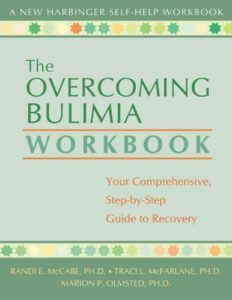 The Overcoming Bulimia Workbook
The Overcoming Bulimia Workbook ![]()
Authors: Randi E. McCabe, Ph.D., Traci L. McFarlan, Ph.D., Marion P. Olmsted, Ph.D.
This 217-page self-help workbook provides a comprehensive, step-by-step guide to recovery from bulimia. Topics in this book include symptoms of bulimia, normalizing eating, managing eating disordered thoughts, relapse prevention, and how to get help from a therapist.
Body Image
 Who Calls Me Beautiful? Finding Our True Image in the Mirror of God
Who Calls Me Beautiful? Finding Our True Image in the Mirror of God ![]()
Author: Regina Franklin
This 144-page book discusses the impact of the world’s standards of the “ideal woman” and how to move beyond these cultural standards to live out God’s understanding of beauty in your life. Suggested for: teenage through adult women faced with the typical challenges of self-image and pursuing true beauty.
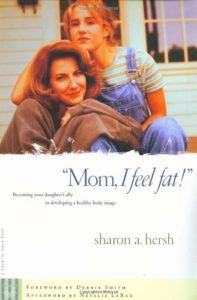 Mom, I Feel Fat
Mom, I Feel Fat ![]()
Author: Sharon A. Hersh
This 215-page book is an excellent resource for mothers with daughters between the ages of seven and seventeen. It provides good instruction regarding the mother’s role in helping girls develop a healthy body image in the midst of cultural pressures. It is largely prevention focused.
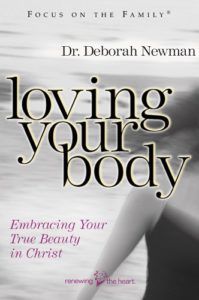 Loving Your Body
Loving Your Body ![]()
Author: Dr. Deborah Newman
This 162-page book focuses on body image issues and offers help through practical, biblical suggestions. It also includes discussion questions at the end of each chapter and specific instruction for how to use the book in a study group. Suggested for: teenage through adult women struggling with body image issues.
 Life Inside the Thin Cage
Life Inside the Thin Cage ![]()
Author: Constance Rhodes
This 227-page book takes a personal look into the world of the chronic dieter and those suffering with an undiagnosed sub-clinical eating disorder. Sub-clinical eating disorders are characterized by unusual, unhealthy eating habits that don’t fit the technical classifications of anorexia or bulimia.
For Family Members of Someone with an Eating Disorder.
Helping Someone with an Eating Disorder: Advice for Parents, Family Members, and Friends [Helpguide.org]
Questions and Answers about Eating Disorders
This 7:35 video shares common questions and answers related to eating disorders. [Lindner Center of HOPE]
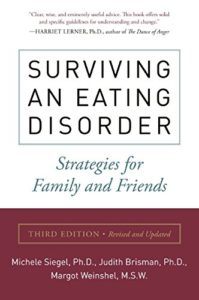 Surviving An Eating Disorder–Strategies for Family and Friends
Surviving An Eating Disorder–Strategies for Family and Friends ![]()
Authors: Michele Siegel, Ph.D.; Judith Brisman, Ph.D.; Margot Weinshel, MS.W.
This 288-page book has been found helpful by friends and family of individuals struggling with eating disorders. It provides comprehensive information on the multiple facets of eating disorders and practical suggestions for how to confront and manage the problem. The support and insight provided in the book can help friends and family understand what can be expected from the eating-disordered individual and also from themselves.
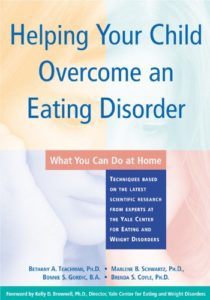 Helping Your Child Overcome an Eating Disorder
Helping Your Child Overcome an Eating Disorder ![]()
Authors: Bethany Teachman, Ph.D., Marlene Schwartz, Ph.D., Brenda Coyle, Ph.D., et al
This 226-page book addresses how family members can support a child struggling with an eating disorder.
 Love First: A Family’s Guide to Intervention
Love First: A Family’s Guide to Intervention ![]()
Authors: Jeff & Debra Jay
This 360-page book discusses how to approach a loved one to help them seek treatment for addiction or other life-dominating condition.





Comments
Leave a Comment